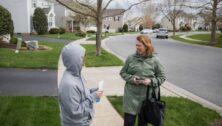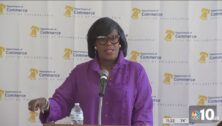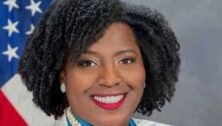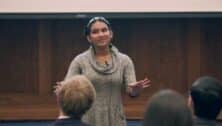Chester County Leadership: Senator Andy Dinniman
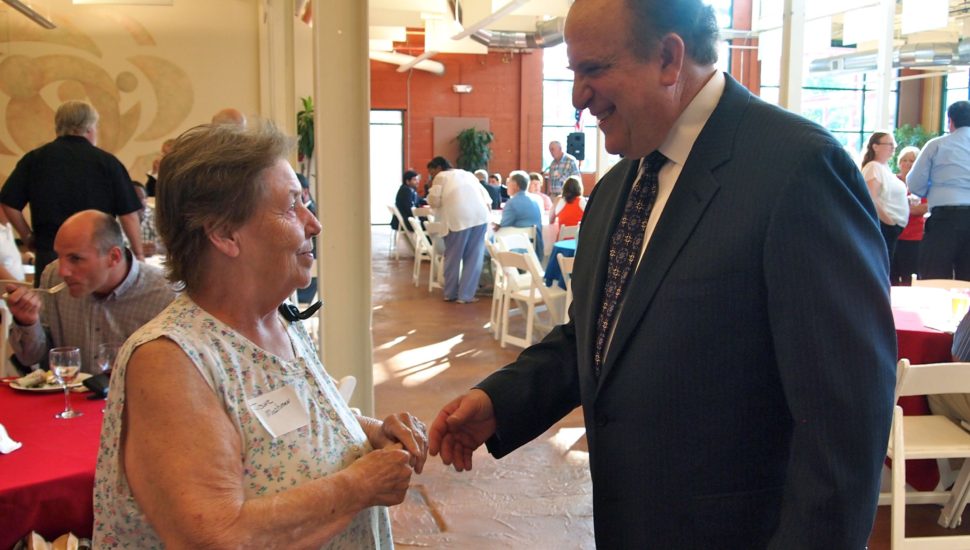
Editor’s Note: This Chester County Leadership profile of Andy Dinniman was originally published on August 26th, 2015.
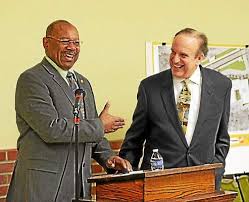
From the time he was elected a member of Downingtown School District’s Board of Director in 1975 and through his three terms as the lone Democrat on Chester County’s Board of Commissioners, Andrew E. “Andy” Dinniman was the hard-charging warrior doing whatever was needed to advocate for his causes and push through his priorities.
For this week’s edition of Chester County Leadership, VISTA Today sat down with Senator Dinniman in Assetto’s Family Barbershop in Parkesburg one recent Saturday afternoon and asked him about his memories growing up on a farm in Connecticut, his first political job collecting tolls, the emergence of his natural leadership abilities in high school and college and how faith shapes his life and community service.
Where did you grow up, Senator?

I grew up on a 200-acre farm in Woodbridge, Connecticut that belonged to my grandfather. We had a lot of cows, ponies, chickens and everything else a typical farm at the time had.
When I was 11 years old, much of the farm was sold, with 20 acres preserved for us to live on. In addition to his farm duties, my father ran a small bus company, and my mother helped manage a fancy dress store in New Haven.
What do you remember about growing up in Woodbridge?
Even though I had responsibilities, I enjoyed life on the farm. While we had milking machines, each cow had to be individually finished, a process called stripping. That was my job! Stripping a cow was still a lot better than shoveling the manure!
Both of my grandmothers played an important role in my life. My father’s mother was a perfect example of unconditional love. My maternal grandmother, who at times lived with us on the farm, was one of the leaders of the New Haven Republican Party. In 1948, I remember my grandmother coming home and expressing her disappointment because Harry Truman had carried her precinct. I was only four years old at the time, but I can still remember her frustration. She lived to be over 100 years old.

What did you learn from your grandmothers?
My maternal grandmother taught me the importance of maintaining a good name, as well as teaching me a certain amount of toughness was needed to succeed. She told me that, “If you walk into a room and no one knows you’re there, why bother going?” She also taught me never to back anyone into a corner because then there was only one way out.
My grandmother also had a great sense of humor. On her 100th birthday, I asked her what the best thing about living to be 100 was. “Andy,” she said, ”the best thing about living to 100 is, I outlived all the sons-of-bitches I didn’t like!”
Did you have any siblings, Andy?
I have one sibling, a brother six years older than me. He is a big guy, so even though I was a pretty thin kid growing up, no one ever bothered me in school. He ended up spending his entire career, including three tours of duty in Vietnam, in Army intelligence.
What jobs did you have while you were growing up?
My first job, in addition to my farm duties, was a political job; taking tolls on the Connecticut Turnpike. One of my neighbors was the state senator for my area. When I was 17, I asked her if she was aware of any summer jobs I could work, and she got me the job collecting tolls. I did it for several summers and can still vividly remember all the buses coming through my toll booth on their way to the Freedom March on Washington in 1963.
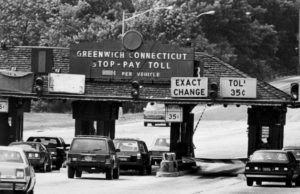
What lessons did you take from your early jobs that still stay with you today?
On the family farm, it would be that things didn’t function unless I fulfilled my responsibilities and that I could succeed if I persevered and worked hard. I was an important part of something larger.
At the same time, I also experienced what it was to be a minority. While neighboring New Haven had a sizeable Jewish community, there were only a handful of Jewish families in Woodbridge. In addition, I developed a deep sense of respect for all faith traditions and a keen desire to learn.
Where did the deep respect for different faith traditions come from?
When I was a teenager, I led a group called Youth For Brotherhood, which included people from each religion and all races. We became a force for young people to come together, talk and take meaningful action in the New Haven area.
Where did you develop your ability to communicate and relate to anyone independent of their social standing or political leanings?
In high school I recognized I had an ability, an enthusiasm if you will, that through my work I could bring people together for meaningful action. I didn’t think much of it at the time. In college at the University of Connecticut, I was class president for three years and head of student government in my senior year. I began to see that I didn’t have to accept things the way they were, nor did I have to be afraid of getting into the public arena and verbally duking it out. I found I could bring about change if I got involved and spoke my mind. It was during my time in college that I developed the ability to bring people together by finding the common thread and being open to a variety of people and opinions. As I reflect back on those experiences, I realize what I was experiencing was an awakening of faith.
Really, faith?
Yes, I would define much of what I do today as driven by faith. Each of us has talents, understands our callings and experiences the Spirit of God in our own way. When I was younger, I didn’t think of it as my ability or skills. I just did what I could do. However, as I’ve gotten older, I realize the role faith played, not only in my own life, but also in the lives of others. For example,
I discovered very early on that when I would organize to feed the hungry or help the poor, some of my more political friends who were not operating on any faith tradition, would abandon the initiative as soon as their car got scratched, or they felt threatened. The people who were operating on a strong religious faith would persevere.
But that role of bringing people together isn’t always easy.
My role is to be the person who brings people together. I am friendly and peaceful when trying to find a solution. When I do get angry people pay attention, since that is not my style. But like anyone, I then need to explain why I was angry. And, of course, it is always easier to bring people together with a smile rather than a frown.
How does your approach play out in the state senate?
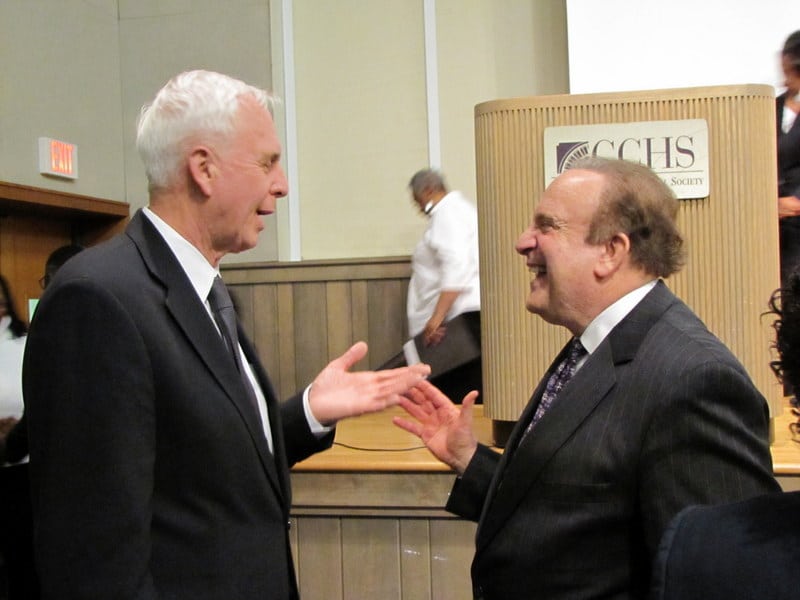
What I have to do is not only talk about being a bridge but I have to put any personal interests aside to get anything done. The polarization you see happening in Washington, and increasingly in Harrisburg, is both destructive and divisive. People on both sides of the aisle are unwilling to share and to dialog.
One of my favorite members of the Senate is Senator Stewart Greenleaf, who represents portions of Montgomery and Bucks Counties. Senator Greenleaf and I have successfully worked on a number of initiatives, including passing laws to combat human trafficking. He and I have also formed a prayer caucus. We are currently planning to visit each others’ districts for a day of service as an expression of faith. We plan to help those in need and will invite others to join us.
Is it hard to put personal interests aside, Andy?
It can be and it is harder for some than others, but you have to realize there is no reason not to. Actually, it is the best way to reach any goal through the legislative and political process.
In a democracy, you cannot go it alone. You won’t accomplish any goals that way. You have to take a variety of separate interests and mold them into a higher, communal interest. If you don’t do that, you end up with precisely the kind of political gridlock we are currently experiencing in Washington and Harrisburg.
What are the great challenges facing the state?
The greatest challenge is to end what I call the metrification of education. Testing is important for diagnostic purposes, so teachers know how to help their students. What we’ve done at both the state and federal level, however, is turn testing into a punishment system and the sole means by which we evaluate schools. I ask people all the time, what is the greatest test they ever took. Of course, they can’t tell me. But when I ask the same people, who their greatest teacher was, everybody knows. Great teachers and continuing the broad American curriculum, including the arts, is what will make our nation’s schools great. The answer is not more and more standardized tests. In fact, almost every single advanced nation in the world is moving away from heavy testing at the same time we are moving towards it. We should take a page from them. Besides, we don’t see the results of the Pennsylvania PSSAs and the Keystone Exams until the next year anyway – when it’s already too late to have a real impact on the kids who took it!
Finally Andy, what is the best piece of advice you ever received?
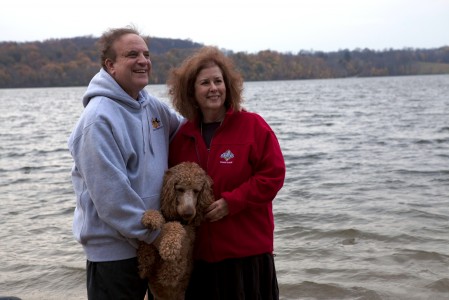
There are three I remember. First, when my grandmother told me to never to back anyone into the corner without giving them a way out – that provides an understanding of reconciliation and working with others.
The second one came from Jim Manderino, who was Speaker of the Pennsylvania House in the 1980s. I told him I was unhappy with a compromise decision he brokered. He said, “Young man, in a compromise, neither party walks away happy.” That is exactly what needs to be understood to solve the current budget impasse.
The third piece of advice is something an old Baptist minister, who was the advisor to the Youth for Brotherhood Group, that I led high school told me. He said, “Always remember Andy when God’s Spirit gets a hold of you it’s never going to let go, so joyously run with it.” Now, that’s great advice.
Connect With Your Community
Subscribe to stay informed!
"*" indicates required fields




































![95000-1023_ACJ_BannerAd[1]](https://vista.today/wp-content/uploads/2023/03/95000-1023_ACJ_BannerAd1.jpg)








